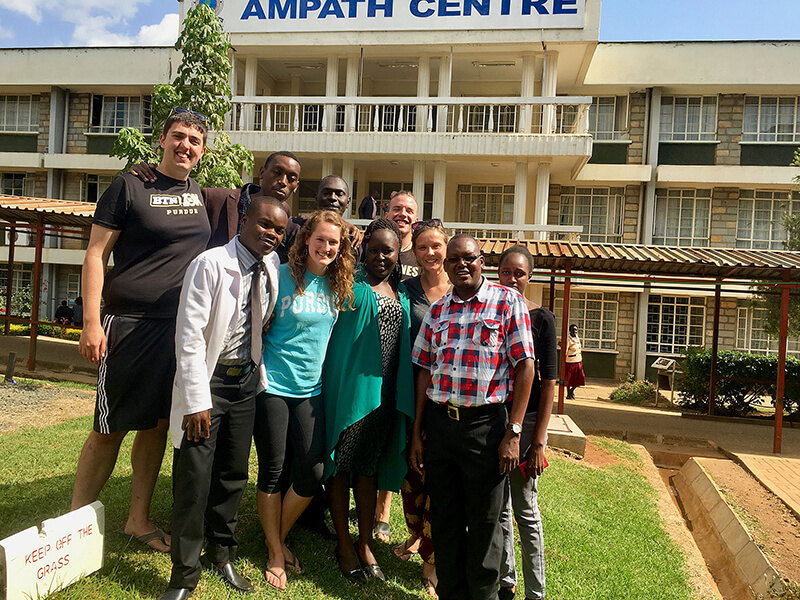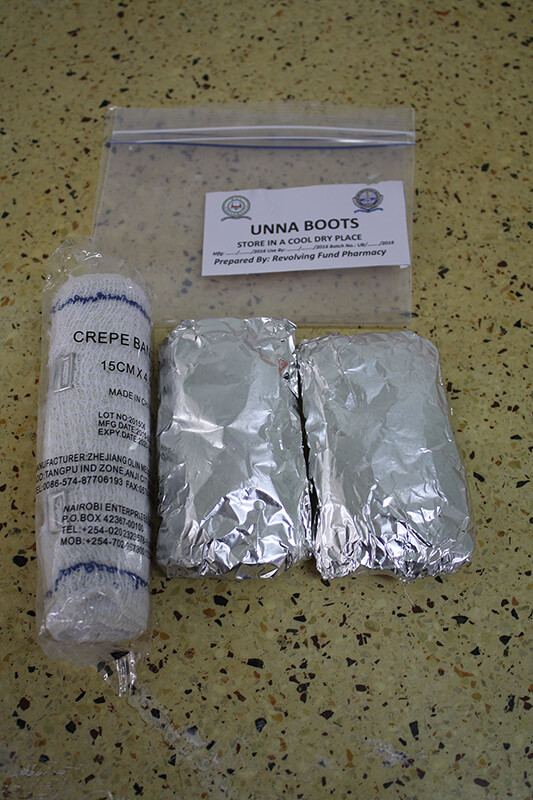October 2, 2018
A life-changing trip: Purdue alum working to reduce deaths from AIDS-related infection after visiting Kenya
 Purdue University alumnus Alexander Mills poses for a picture in Kenya, where he helped develop an innovative wound dressing. Back row (left to right): Alex Mills, Peter Njenga, Thomas Rotich and Mario Hoyos. Front row (left to right): Clovis Nyanaro, Katherine Curtis, Egla Boiywo, Karolina Grzesiak, Paul Sikamoi and Natalie Sang. (Image provided)
Download image
Purdue University alumnus Alexander Mills poses for a picture in Kenya, where he helped develop an innovative wound dressing. Back row (left to right): Alex Mills, Peter Njenga, Thomas Rotich and Mario Hoyos. Front row (left to right): Clovis Nyanaro, Katherine Curtis, Egla Boiywo, Karolina Grzesiak, Paul Sikamoi and Natalie Sang. (Image provided)
Download image
WEST LAFAYETTE, Ind. – What Purdue University alumnus Alexander Mills saw during his pharmacy student service-learning project in Kenya changed his career path. Now, he is on a journey to reduce the morbidity from Kaposi Sarcoma, one of AIDS’ most debilitating opportunistic infections.
“What really drove me to take this idea from start to finish was focusing on the needs of the patients I was ultimately hoping to serve and improve their lives,” Mills said. “I grew to appreciate the challenge in finding the best way to care for the underserved and cherish the moment when you can celebrate that victory after finding a way to fill even the smallest patient need.”
Mills and other Purdue team members noticed that commercially available wound compression bandages are too expensive and not readily available in sub-Saharan Africa, which means otherwise treatable skin conditions and infections are claiming more than 1 million lives each year.
A Purdue team from the College of Pharmacy worked with staff at Moi Teaching and Referral Hospital in Kenya other North American schools in the Academic Model Providing Access to Healthcare (AMPATH) consortium to develop a low-cost and sustainable wound-healing compression bandage kit.
 A Purdue University team from the College of Pharmacy worked with staff at Moi Teaching and Referral Hospital in Kenya and other North American schools in the Academic Model Providing Access to Healthcare (AMPATH) consortium to develop a low-cost and sustainable wound-healing compression bandage kit. (Image provided)
Download image
A Purdue University team from the College of Pharmacy worked with staff at Moi Teaching and Referral Hospital in Kenya and other North American schools in the Academic Model Providing Access to Healthcare (AMPATH) consortium to develop a low-cost and sustainable wound-healing compression bandage kit. (Image provided)
Download image
“Our initial focus was on the often forgotten public sector patients in low-income settings with debilitating wounds,” said Sonak Pastakia, a Purdue associate professor of pharmacy practice, who recently completed the Jefferson Science Fellowship for his work with the Purdue Kenya Partnership. “In these areas, wound-care dressings are frequently needed but largely unavailable or unaffordable.”
The Purdue team helped create a novel version of compression wrapping made entirely of low-cost materials locally available in sub-Saharan Africa. The compression kit is sold for about $2, which is substantially less than the commercially made alternatives available in the United States.
“What makes this approach truly unique is that it is contextualized to the resource constraints of the setting we intend to serve,” Pastakia said. “Instead of trying to introduce unsustainable products through donation, we have introduced a commercially viable and effective wrap which could be utilized in similar settings across sub-Saharan Africa.”
The work also aligns with Purdue's Giant Leaps celebration, acknowledging the university’s global advancements made in health, longevity and quality of life as part of Purdue’s 150th anniversary. This is one of the four themes of the yearlong celebration’s Ideas Festival, designed to showcase Purdue as an intellectual center solving real-world issues. Solutions such as this wound dressing are also a focus of Purdue’s Discovery Park District.
The Purdue kits are being used within public sector pharmacies tied to AMPATH in sub-Saharan Africa.
“This experience for me started off as a moment of significant learning related to patient care,” Mills said. “I learned that knowledge only plays a small role in the process. Putting my heart and passion into what I do and who I serve will take me, my patients, and my team a long way.”
The researchers have worked with the Purdue Office of Technology Commercialization on their innovation. They are looking for partners to provide additional financial support for scale-up or guidance on a more efficient approach for producing the kits as demand continues to grow.
About Purdue Office of Technology Commercialization
The Purdue Office of Technology Commercialization operates one of the most comprehensive technology transfer programs among leading research universities in the U.S. Services provided by this office support the economic development initiatives of Purdue University and benefit the university's academic activities. The office is managed by the Purdue Research Foundation, which received the 2016 Innovation and Economic Prosperity Universities Award for Innovation from the Association of Public and Land-grant Universities. For more information about funding and investment opportunities in startups based on a Purdue innovation, contact the Purdue Foundry at foundry@prf.org. For more information on licensing a Purdue innovation, contact the Office of Technology Commercialization at otcip@prf.org. The Purdue Research Foundation is a private, nonprofit foundation created to advance the mission of Purdue University.
Writer: Chris Adam, 765-588-3341, cladam@prf.orgSource: Sonak Pastakia, spastaki@gmail.com

